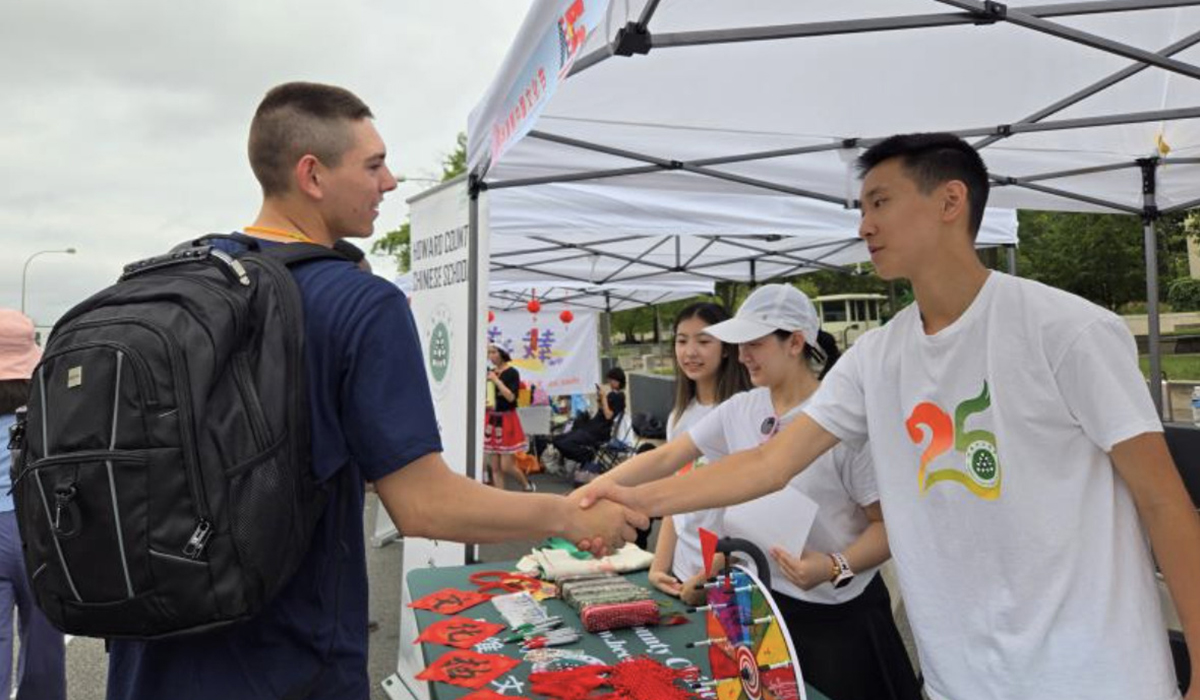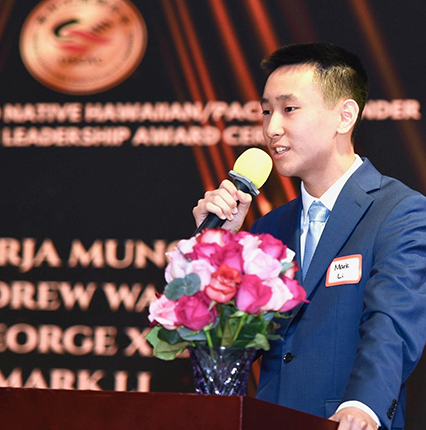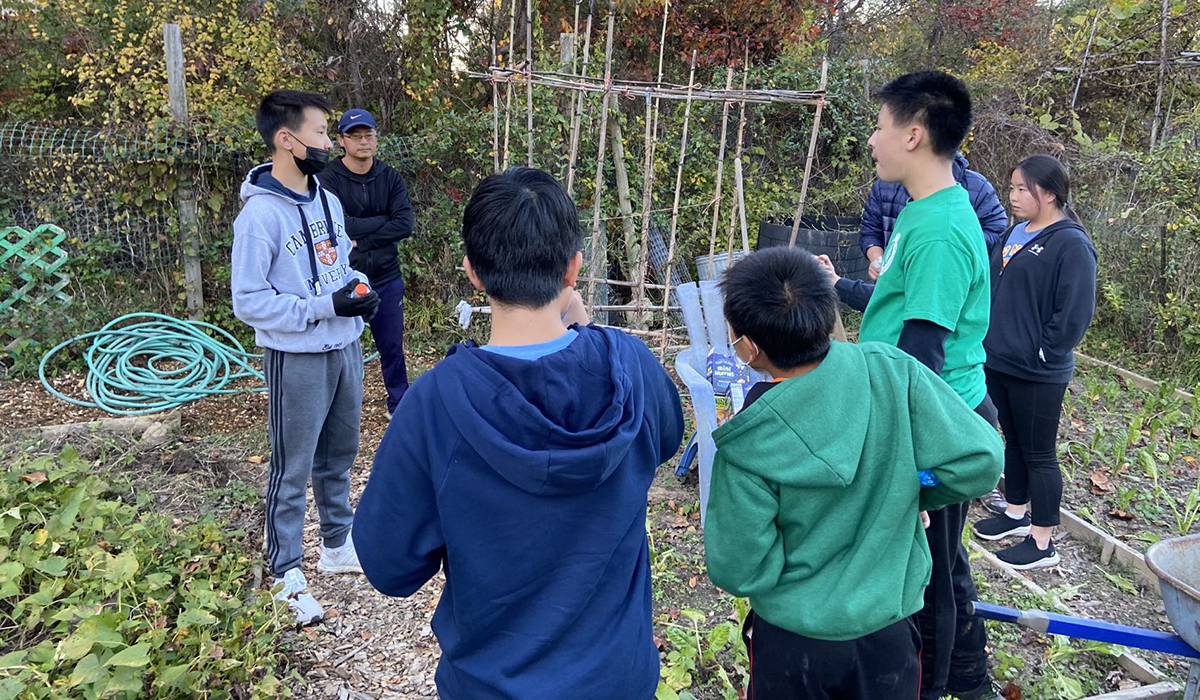From Idea to Impact, with a Team of Youth Ambassadors

Meet Daily Point of Light Award honoree Mark Li. Read his story, and nominate an outstanding volunteer or family as a Daily Point of Light.
When the world seemed to be turning inward during the COVID-19 pandemic, a different kind of call to action was heard by a young man named Mark Li. Witnessing the painful rise in anti-Asian hate, Mark channeled his own experiences and empathy into a powerful force for good. He didn’t just see a problem; he saw an opportunity for connection and change. This vision led him to found the AAPI Youth Ambassadors Program, a nonprofit organization built on the simple yet profound idea that young people can be the architects of a more inclusive and compassionate community.
As the founder and executive director, Mark is deeply involved in the day-to-day work, dedicating an average of 40-50+ hours each month to a wide range of activities. He’s not just an organizer; he’s a participant, whether it’s tutoring young AAPI children in reading and music, coordinating monthly donation drives for books and school supplies that serve thousands, or getting his hands dirty in the nonprofit garden that has harvested and distributed over 15,000 pounds of fresh vegetables to families in need. This direct involvement ensures that the organization’s mission remains rooted in the needs of the community it serves.
Mark is a skilled advocate who has secured more than $750,000 in funding from local and state governments to expand critical programs. His commitment to civic engagement is evident in his coordination of over 200+ translations of political campaigns, ensuring more than 4,000 documented immigrant families are informed and empowered at the ballot box. This work, alongside his leadership in training dozens of young advocates who have gone on to testify before government hearings, is based on his belief in building long-term capacity for youth leadership and civic engagement.
For Mark, it’s about more than just immediate relief; it’s about empowering a new generation to find their voice and use it for good. From a simple idea born during a time of crisis, he has built a powerful platform that ensures not only immediate relief but also a long-term future of leadership and dignity for immigrant, senior and low-income communities. Read on to find out more about Mark’s story.

Tell us about your volunteer role.
My organization is the AAPI Youth Ambassadors program. I founded this organization with a group of other students who are very, very passionate about equal rights, and not just rights pertaining to race, but rights pertaining to age, gender identity and other demographics that we think are often overlooked. During the COVID-19 pandemic, when we started it, I experienced racism. I experienced marginalization because I was Chinese. There was a sense of division that I felt between my friends and my peers at school, at the store, whatever I would get these weird glances. All in all, I just want to say that this organization was birthed from a desire to have other kids not experience that experience of hatred, that experience of feeling lonely. Everyone was vulnerable during the pandemic, and it was a time when especially our youth had to feel secure, safe and grounded in community.
Why is this issue so important to you?
Our belonging isn’t defined by what others think we are. It’s defined by our very own dedication, our very own sweat, our very own effort toward bettering our community. We started originally making organic soaps, organic health kits for those who were experiencing this pandemic but didn’t have natural ability to help themselves, to take care of themselves. And then after that, after the COVID-19 pandemic passed, we moved into policy work. We moved into environmental work. We had a wide array of kids passionate about different things, but we were all committed to the same overarching mission of reducing inequality through service.
Right now, as the founder and executive director, besides overlooking and facilitating the function of the organization, I do spend most of my work on the policy and legislative side as well as the environmental side. I think these two areas tie into a lot of how our youth see the world, see the future and see the nation that we will inevitably inherit. For better or for worse, we will inherit this nation… that’s inevitable. So my goal, really, is to ensure we as youth have the best world possible, and to continue to make it better, combating the systemic inequalities that we face.
What are your long-term plans or goals with the organization?
Currently, I’m proud to say we have made many progresses here locally – I live in Maryland. We have initiated the changes in legislation in the Maryland General Assembly. Our work does focus on the AAPI community. AAPI stands for Asian American Pacific Islanders. We really focus on things like making sure that our curriculum is included into the public school history curricula. It’s so important to recognize not only Asian Americans, but all types of Americans in this beautiful melting pot of a nation, and recognize that we are all cornerstones. That has been an initiative that we have seen success in that we are continuing to push in the state and local legislatures.
Long term, we are seeking to prepare our youth to lead a life of service, to lead a life of fulfillment through helping others. And I think all of my work has been driven by my lived experiences. I don’t feel comfortable speaking on behalf of others, but I think that this work is valuable, because when you focus on one specific marginalized demographic, such as the AAPI community, it shows what we can do for the other demographics that are often marginalized. We set an example for what we can do. In a world of so much division right now, obviously the headlines dominate a lot of what our youth perceive the world to be, whether that’s in politics, sports or the healthcare system, whatever it may be. I operate with this mindset as I design these goals for the future. What’s the most tangible, what’s the most effective way we can get our youth on the ground and running and not just being performative.
People power is the greatest power, in my opinion. Currently, we are fundraising a lot. We have raised over $750,000 from federal grants, county grants from the government. We are a nonprofit, so, anything that comes to us, we are absolutely ready for. We conduct water quality tests for our neighbors with wells. We conduct road cleanups on our roads that we have through the Adopt a Road program here in Maryland. We host national AAPI conventions for our youth, for our high school students or college students. We’re always ready for more collaboration with government institutions and with NGOs as well. It’s really been a pleasure to work with these amazing people. And I think it’s the stories that make me proud of the work that we’ve done.
What’s one rewarding story from your work?
There have been so many moments over time. If I had to pick one, it would be when we harvested a few hundred pounds from our garden. We donate produce in collaboration with these amazing organizations that help people who need it. This one day, it was early in the morning. We had just worked hard. We dug all the vegetables out of the ground. We approached the Crisis Intervention Center, and there was an older man there. He told me that he was super grateful for us giving him his dinner that day. The Crisis Intervention Center is incredible, but it isn’t Superman. No organization has unlimited resources. Seeing the impact we made on this one man helped all of us understand the importance of extending helping hands.

Why is it important for youth to get involved with causes they care about?
Ignorance is rampant in our communities. It’s up to youth like myself, like the peers that I work with, to re-engage our communities and remind them why people like us, nonprofit workers, healthcare professionals or teachers volunteer our time to help others. I think that’s the best way to remind us of our own humanity. It’s tempting to crawl up in our in our beds, stay in our rooms, let our parents do what they do, earning their incomes, while we just live life. But throughout my experiences, I’ve learned that being passive is no way to go about changing things. American is a democracy where we can advocate for ourselves, but you are only being a responsible citizen by actively advocating for not only yourself, but those who are often voiceless too.
What have you learned through your experiences volunteering?
Leadership isn’t about being the loudest or even being about the most proud. It’s about being consistent, about being present every time. Starting an organization isn’t easy, because you are responsible for engaging other people who might not understand the importance of what you’re trying to do. Right off the bat, you have to really communicate the value that you see, the vision that you see. Service has taught me that impact really isn’t defined by how much visibility you get. It’s about how deeply you can listen, how deeply you can then take what you listen and then convert that into improving your own service and thus serving more effectively.
Any advice for people who want to start volunteering?
I was motivated by my own lived experience. If I hadn’t witnessed and experienced those marginalized, I wouldn’t have started this organization. But we want our work to be sustainable. So if you’re chasing these big accomplishments in service right off the bat, you’ll burn out. It’s not the right reason to serve. Instead, anchor yourself in the small parts of the journey first, whether that’s just reaching out to a teacher that you’ve appreciated or helping an elder in your in your community with their groceries. Ask, ask, ask, ask. If you never ask, you’ll never learn what the needs in your community are, and how you can help respond to them.
Do you want to make a difference in your community like Mark? Find local volunteer opportunities.